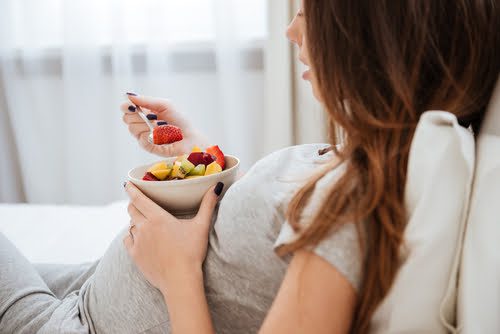Daily Diet of A Pregnant Woman

The fetus receives nourishment from its mother. The future well-being of the unborn child and the mother also in many cases depends on the diet during pregnancy. Many mothers are hesitant about what to eat and what not to eat. Many people are also worried about being overweight.
Doctors have a role to play in the birth of a healthy child, but that is not the main thing. In fact, a healthy mother can ensure the birth of a healthy baby. For this reason, doctors and nutritionists always advise pregnant mothers to take care of their bodies. Just as his food is nutritious and healthy, so he must maintain his cleanliness. The food you eat should be properly cleaned and disinfected so that he does not get infected with any contagious disease.
Studies conducted at different times have shown that the children of pregnant mothers suffering from malnutrition are underweight and short in stature. In many cases the child dies in the womb, the child dies shortly after birth, the risk of miscarriage increases, the child is born prematurely, leaving the child immature. Just as there are various misconceptions about the diet of pregnant mothers in Bangladesh, due to ignorance, it is not possible for many to eat proper food.
Many people think that if the mother eats more food, the fetus will grow in size. Then normal delivery will not be possible. So the pregnant mother is allowed to eat less. Which can bring terrible danger to mother and baby.
Again, according to many, a pregnant mother should eat two meals a day. That’s not right either. Because obesity is associated with overeating. Overweight mothers are more likely to have stillbirths or small children. But no matter what the food, it must be nutritious. For this, all the elements of food should be present in the daily diet.
Protein or meat
Protein or non-vegetarian food should be taken 90-100 grams daily. That is more than other people. This amount of protein is obtained from three pieces of meat in medium size. Protein can come from fish, meat, eggs, milk, pulses, nuts, bean sprouts. Protein helps in the proper formation of fetal cells and brain. Increases the mother’s nipples. The pelvis is suitable for childbirth.
Fat
Fatty foods are a good source of energy. These use fat-soluble vitamins. And these vitamins ensure the proper structure of the nervous system. Fats are obtained from ghee, butter, oil, meat fats.
Carbohydrates or sugars
Sugary foods also provide energy to the body. Sugars are found in rice, bread, chira, murdi, khai, potatoes, sugar, sweets and molasses. Excess carbohydrates should be avoided.
Calcium
In order to build the bones of the newborn baby, it is necessary to increase the amount of calcium in the diet in the last three months of pregnancy. Milk and dairy products are good sources of calcium. However, if you can’t eat more milk, you can meet the demand for calcium by eating pulses, small fish etc. Pregnancy requires 1000 mg of calcium daily.
Vitamins
Vitamin ‘A’ and Vitamin ‘B complex’ are very important for the formation of the baby’s body. In addition, there is a risk of bleeding during pregnancy, so vitamin K is very necessary at the end of pregnancy. The baby needs bone as well as calcium as well as vitamin D. Because this vitamin helps to absorb calcium from food. Vitamin ‘C’ is very essential for pregnant mothers for their own skin and for the skin and hair of the newborn. Foods from which such vitamins are available are milk, butter, eggs, lamb, cod liver oil, hilsa fish, tomatoes, carrots, spinach, beets, spinach, meat, various types of pulses, potatoes, etc. From different types of fruits and vegetables such as oranges, tomatoes, green peppers, onions, mangoes, guavas, plums etc. 60 to 100 mg of vitamins should be taken daily.
Iron and folic acid
Foods rich in folic acid and iron should be eaten before conception. Because the deficiency of these two is more seen during pregnancy. Iron and folic acid are found in milk, eggs, fish, meat, chalta, molasses, liver, ripe bananas, dates, mangoes, tomatoes, watermelons, green vegetables, black cabbage, etc. The first three months of pregnancy require 600 micrograms of folic acid and 26 milligrams of iron per day.
- Calories
Pregnant mothers need more calories than others. For this, in the first three months, you have to eat as much calorie rich food as you have eaten every day before conceiving. The next three months require an additional 300 calories daily and the last three months require an additional 200 calories daily. So if he eats 1400 calorie food first, then he has to give 1400 + 300 = 1800 calories in the second three months, then he has to give 1600 + 200 = 1900 calorie rich food in the next three months. If a pregnant mother gets 1800 calories in the first three months, she will get 2100 calories in the last three months. These calories should be increased from protein or non-vegetarian foods. This is because the fetus grows with protein-rich foods.
The total weight gain during 9 months of pregnancy should be 10 to 12 kg. If it is more than this, just as it can be difficult to give birth to a healthy child, it will also be difficult to bring the mother’s weight back to normal in the future. So we must be careful about this.
Those who are already overweight can gain five to eight kilograms of gestational weight. Those who weigh much less than before, if their weight increases up to 15 kg, there is no harm.
Hemoglobin deficiency in mothers is seen in most cases during pregnancy. The result is anemia. This is because at this time the hemoglobin in the mother’s blood decreases after the fetus meets the demand for iron. In Bangladesh, 75% of pregnant women suffer from anemia to some extent. Anemia can lead to weakness, mental exhaustion or fatigue, palpitations, dizziness, etc. Liver, egg yolk, meat, black and green spinach, beets, lettuce, turmeric etc. should be eaten. In addition, it is better to eat one or two pickled fruits every day.
Pregnancy is divided into three parts. The amount of food in each portion should vary slightly. If the food list is correct, it is possible to give birth to a healthy and strong baby. Below is a general idea about this.
1600 calories daily for the first three months
Breakfast
Bread – 60 grams = 2 pieces
Eggs-one / pulses-10 grams
Vegetables as desired.
10-11 in the morning
Mudi / Biscuit / Cake etc. -60 gm + fruit
Lunch
Rice-two cups = 240 grams
Fish / meat – 60 grams
Pulses-half cup, medium thick
Vegetables as desired.
Breakfast in the afternoon
Noodles / Chholamuri / Semai etc.-
30 grams
Dinner
Like noon.
Before bed
Milk-1 cup
1900 calories daily for the second three months
Breakfast
Bread – 90 grams = 3 pieces
Eggs – 1 hour / meat – 2 pieces
Vegetables as desired.
10-11 in the morning
Milk-1 cup
Biscuits / turnips / noodles etc. – 30 grams + fruit
Lunch
Rice – 300 grams = two and a half cups
Fish / meat – 60 grams
Pulses-1 cup, vegetables as desired.
Breakfast in the afternoon
Semai / Noodles / Chholamuri / Cake etc. – 40 gms
Dinner
Like noon.
Before bed: 1 glass of milk
2100 calories daily for the last three months
Breakfast
Bread / Bread – 120 grams = 4 pieces
Eggs – 1 o’clock
Vegetables as desired.
10-11 in the morning
Milk-1 cup
Any breakfast – 60 grams + fruit
Lunch
Rice – 360 grams = 3 cups
Fish / meat – 100 grams
Pulses -1 cup, thick
Vegetables as desired.
Breakfast in the afternoon
Breakfast made of milk or milk-60
Breakfast made of gram or dal.
Dinner
Like noon.
Before bed: 1 glass of milk.
- Is It Safe To Have Sex During Pregnancy ?
- Foods to Eat When You’re Pregnant
- What to Wear during Pregnancy time?
- Treatment of breast cancer in Bangladesh
- Breast cancer warning for working women
- Breast Cancer Symptoms, Causes, and Treatment
- Breast cancer can comes back !
- Tea can cure breast cancer !
- What lifestyle can lead to breast cancer?
- 5 Natural Moisturizers You Can Find In The Kitchen

